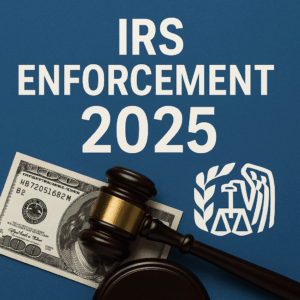IRS Enforcement 2025: 4 Steps High-Income Taxpayers Must Take Now
IRS Enforcement 2025: 4 Steps High-Income Taxpayers Must Take Now
The IRS enforcement 2025 campaign is underway, and high-income individuals, entrepreneurs, and owners of complex partnerships are squarely in the crosshairs. In this post, I’ll outline what’s driving the IRS’s increased scrutiny, who’s at risk, and 4 steps you can take now to protect yourself.
Why Is IRS Enforcement Rising in 2025?
Thanks to increased funding from the Inflation Reduction Act and advances in data analytics, the IRS has been able to hire thousands of auditors and revamp its technology. Their stated priority: auditing high-income earners, passthrough businesses, and taxpayers with complex returns.
In fact, the Treasury Department reported that audit rates on individuals earning over $400,000 annually are already increasing — with an even sharper focus planned for 2025.
If your return includes significant Schedule C or K-1 income, foreign accounts, or aggressive deductions, the odds of being audited are higher than they’ve been in over a decade.
Who Should Be Concerned About IRS Enforcement 2025?
If any of the following apply to you, you’re in the group the IRS is focusing on:
✅ Annual income over $400,000.
✅ Ownership in multiple businesses or partnerships.
✅ Significant foreign income or assets.
✅ Large losses or questionable deductions.
For more about audit risks by income level, check the IRS’s own Data Book
How to Prepare for IRS Enforcement in 2025
To protect yourself from audits and minimize your risk of penalties, take these steps now:
1. Review Past Returns for Red Flags
Go over your last two years’ returns with a tax advisor. Look for aggressive deductions, unsupported losses, or unreported income that could invite scrutiny.
2. Strengthen Your Documentation
Ensure you have organized and complete records for all deductions and credits claimed. Records created contemporaneously (i.e. at the time the expense occurs) provide the best support for deductions.
3. Disclose Foreign Assets
If you have foreign accounts or investments, make sure you’re filing the required FBAR and FATCA forms. Consider voluntary disclosure if you’ve missed filings.
4. Stay Current and Conservative
Pay estimated taxes on time, avoid overly aggressive strategies, and consult with your advisor before making moves that could raise red flags.
Why Act Now?
The IRS enforcement 2025 initiative is about more than audits — it’s about restoring compliance at the top end of the income scale. High-income taxpayers who ignore the new climate risk audits, penalties, and even reputational damage.
Links:
– Treasury Department Newsroom
—
**Disclaimer:** The information provided in this blog post is for informational purposes only and should not be construed as legal, tax, or accounting advice. Tax situations are often complex and highly specific to the individual or business. You should contact a qualified tax expert directly to discuss your particular circumstances. Nothing herein is intended to, nor does it, create an attorney-client or advisor-client relationship. For individual guidance, please contact us directly.



